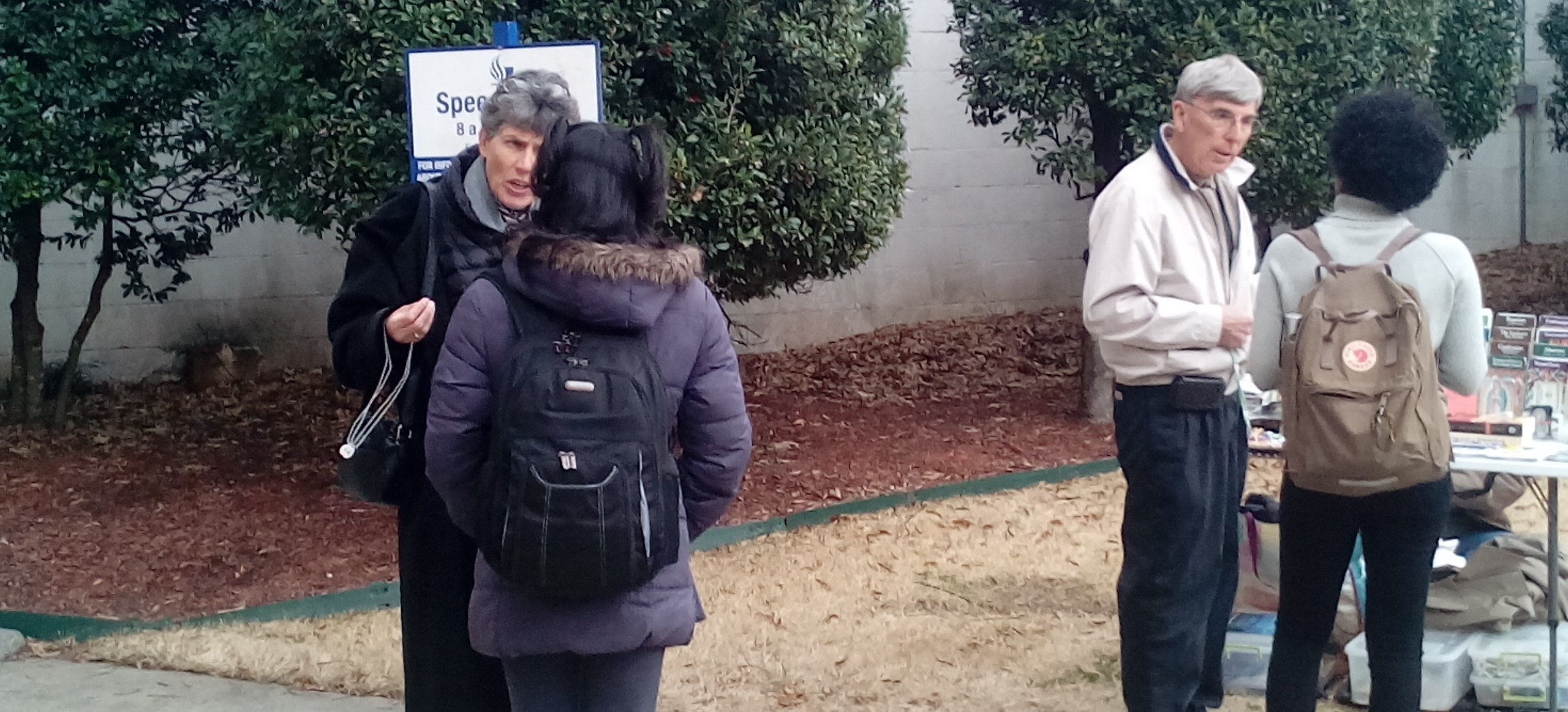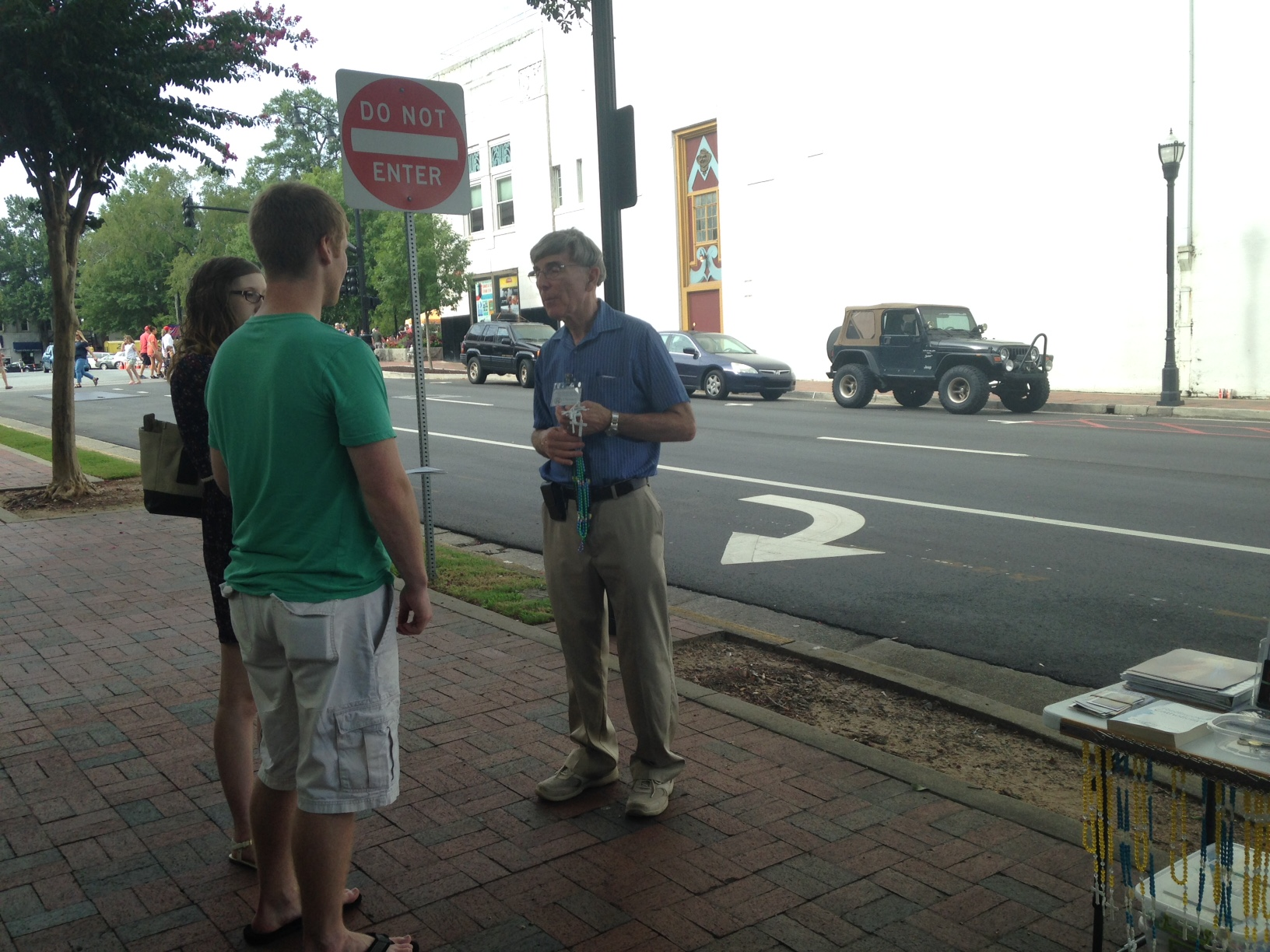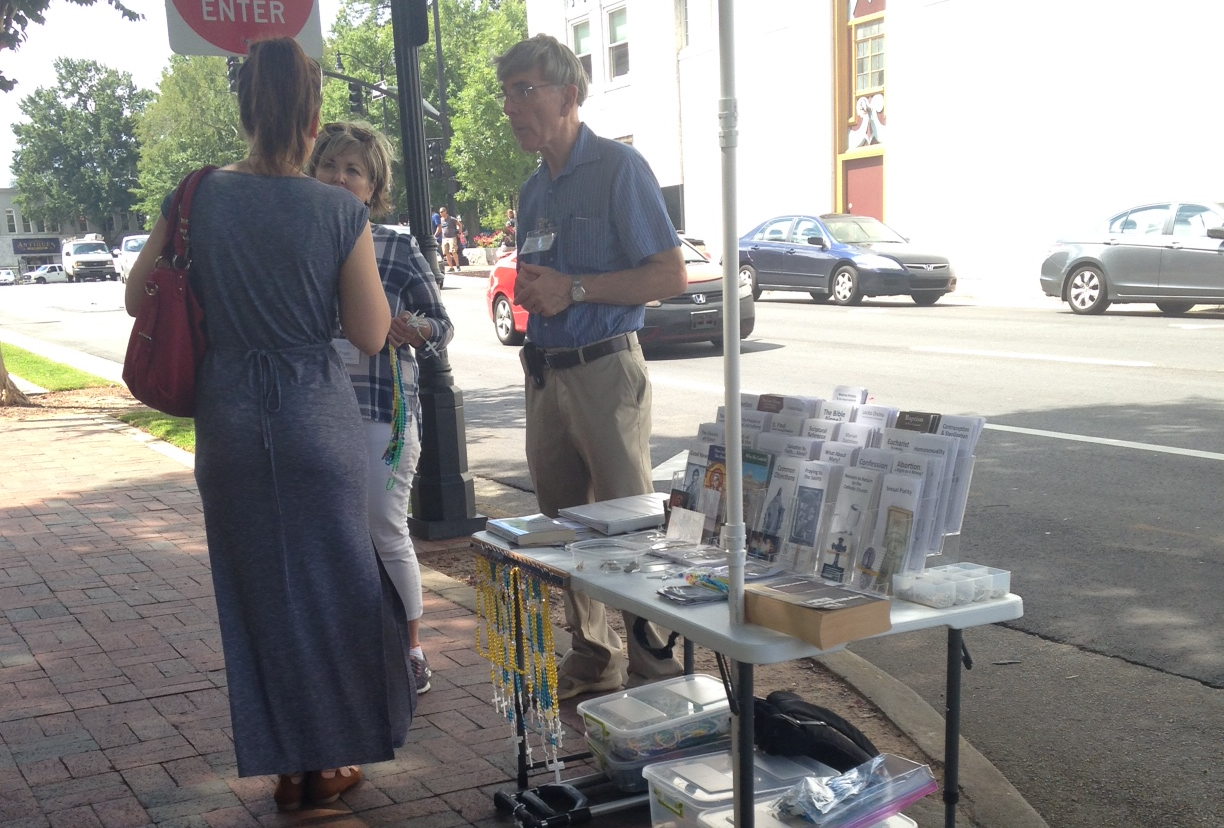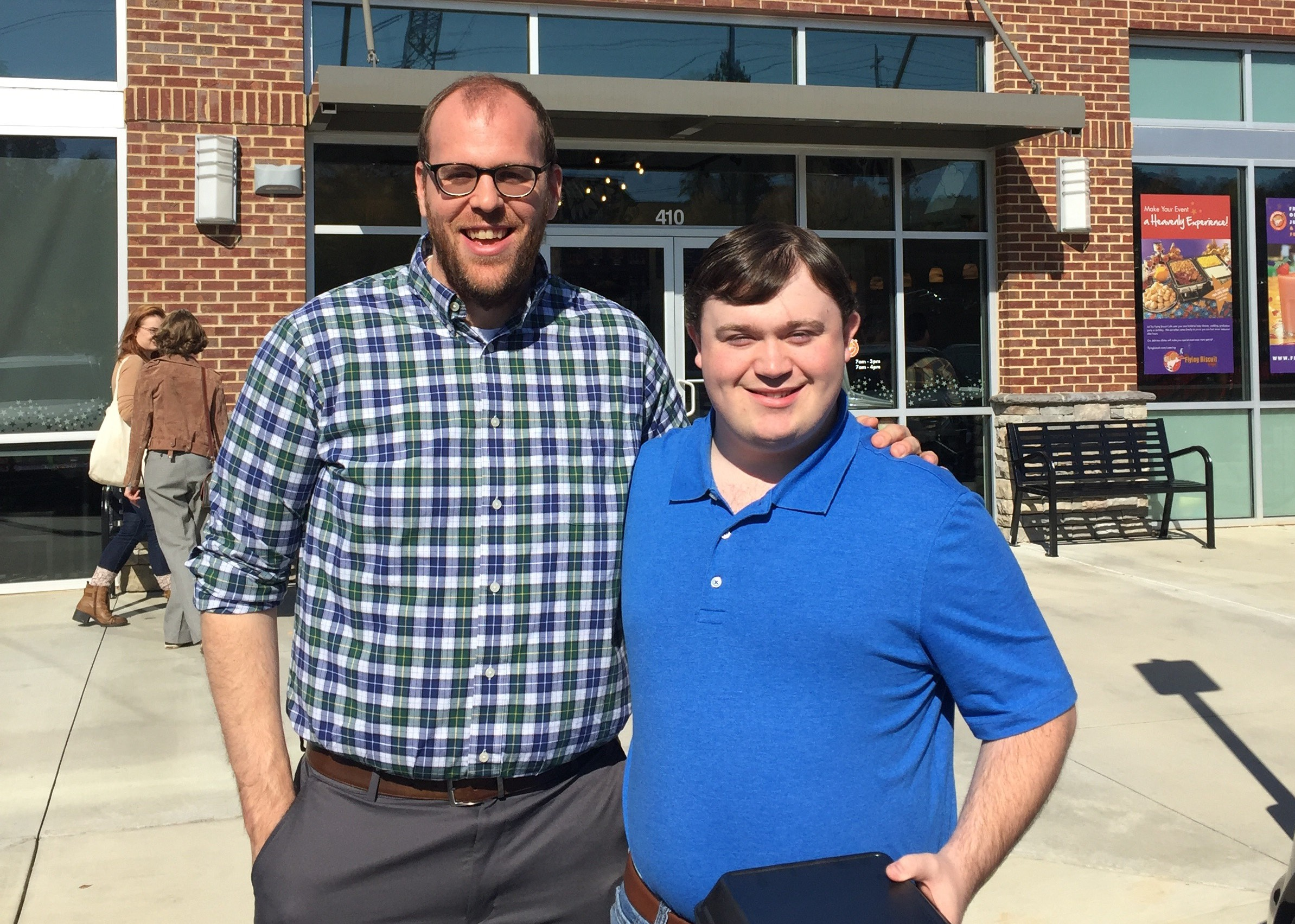
- Home
- Blog
- Calendar
- Get Involved
- National
- Resources
- Partners
- Donate
- Prayer Requests
More on Sunday’s readings
February 28, 2025
Luke 6:43-45, “A good tree does not bear rotten fruit, nor does a rotten tree bear good fruit. For every tree is known by its own fruit. For people do not pick figs from thorn bushes, nor do they gather grapes from brambles. A good person out of the store of goodness in his heart produces good, but an evil person out of a store of evil produces evil; for from the fullness of the heart the mouth speaks.”
Commentary: The heart is the center of the person and the origin of all moral decisions. The goodness or wickedness of our heart is revealed through our life and deeds.
What Is Truth?
April 13, 2020

Hank, an atheist, has been greatly infected by the culture of death. He is a lost soul like many on college campuses today. But he's reaching out for something this day to Clarence and Cathy, two St. Paul Street Evangelists from the Atlanta team. There must be a searching deep within his soul, and hopefully, God will win the day. Here's what happens when they meet:
So, Clarence asks Hank, "What is Cathy my fellow evangelist, telling you?" Hank replies, "About how we choose to go to hell."
"Oh," said Clarence. "I don’t want to go there."
"I know right? It doesn’t sound too great," Hank said.
Well, Clarence asked, "How DO you go to heaven? Did she tell you?"
"No," said Hank. "Not yet."
"Well," said Clarence, "she should."
And so they did. Clarence and Cathy witnessed to Hank about Jesus' death on the cross for mankind's salvation, of the need for a deep, loving relationship with Christ. "Take up your cross and follow Him. He is the narrow gate," Cathy said. Added Clarence: "We want to follow our own will, but that is not the way ... Jesus showed us on the cross what love is."
Silently, the two evangelists are praying, sensing Hank's resistance.
Hank stiffened, then declared: "I don’t believe that God exists."
"You don't?" asked Clarence.
"No," he said.
"Oh no," Clarence said. "There's a lot of evidence God exists. I have an idea: Ask Mary, the Mother of Jesus if she will show you that God exists _ the God you don’t believe in. Ask her if God exists, then somehow show you. Then see what happens."
The evangelists offer Hank a Miraculous Medal, explaining its divine origins and the many miracles associated with it __ even how a bullet was deflected by the medal Pope John Paul II was wearing the day a gunman attacked him on St. Peter's Square. It saved the now canonized saint from certain death.
Hank listens, but without understanding. And he poses virtually the same question Pontius Pilate asked Jesus some 2,000 years ago before condemning Him to death: "What is truth?"
Hank notes many religions claim to have the truth, but he says it could be hidden down any rabbit hole _ many _ or in his case, none. He's heard some Islamic teachings. "Maybe that's true," he muses. And he talks about Judaism. Even Scientologists, he notes, consider their beliefs true and most religions "all hold their prayers are true."
What's more, Hank adds, "I see no evidence for a soul." Cathy responds to his secular, material worldview: "You won't see physical evidence for a soul because it is immaterial."
Clarence tries talking about Jesus' death and Resurrection and how the crucifixion was a historical event. It really happened. But Hank asks: "How do we know after the fact that it's true? I don't buy that."
Nothing seems to connect.
Furthermore, Hank offers what he thinks is a big problem with Christianity: When Christians link romantic love with sexual interest _ Hank asserts _ "you end up creating unhealthy behaviors towards sex." Says Hank, "sex is pleasurable." And, he sees nothing wrong with pursuing it with anyone.
By now the evangelists are thinking "Not so!"
"You're getting things backwards," says Clarence. Patiently, he and Cathy explain the Christian foundations of love, marriage and sex __ how Christians who are dating seek to remain chaste before marriage, expect to keep sex exclusively to marriage, and are very much committed to each other in love.
"But I feel like you are putting sex on way too high a pedestal," Hank objects. "Oh?" said Clarence. "It's God's pedestal. Actually that high pedestal is a wonderful thing. It brings true peace and joy in the heart."
Somewhere along the way, Hank's God-given conscience has been deformed, twisted by Hollywood or TV sitcom lies about sex, or by the hookup culture today that drives young people to sate their desires first.
They can't go on. Hank has class now and says goodbye, fading into a crowd of young people all seeking a higher education.
But today, two St. Paul Street Evangelists have sought to give him the highest education of all, to love and serve God with all his heart, mind and soul.
"There is some reason that Hank came to us," Clarence muses to Cathy afterward. "He must be searching. What he heard from us should give him a choice to choose God or not." Cathy agrees and they pray for Hank, hoping one day God will find he who is lost _ as in Luke, chapter 15: "`Rejoice with me; I have found my lost sheep.' " I tell you that in the same way there will be more rejoicing in heaven over one sinner who repents than over ninety-nine righteous persons who do not need to repent."
Which will it be? Your church or mine?
April 6, 2020
Amos, a Mormon student at a big university in Georgia, wanders by a St. Paul Street Evangelization table one day on campus. He’s curious about the Catholic faith.
“Free Rosaries!” the SPSE evangelist, Clarence, says. Amos responds, “I am of a different faith.” Flashing a friendly smile, Clarence quips, “How do you know what faith I am? Is it the Rosaries?” A chuckle or two and the ice is broken. One Mormon, one Catholic get down to matters of faith.
Clarence asks Amos about his Mormon beliefs. Amos, it turns out, is very inquisitive and asks Clarence about his own beliefs. Going deep quickly, Clarence throws Amos a challenge: “Should I join your church or should you join mine?” Amos laughs and adds, “I think both of us have a preference, but I think it is always worth discussing.”
"Well," said Clarence, “Let me challenge you the way that I would challenge any Mormon. In the Book of Mormon, you have revelation after the death of the last apostle. With all other Christians, public revelation ends with the death of the last apostle. However, Mormons believe revelation concerning salvation follows the death of the apostle John.”
Clarence says, presents a big problem.
“The Mormon revelation that you have contradicts history—like the twelve apostles, the Latter Day Saints you have in this country. There is no history for it,” Clarence notes. “We have history for the original twelve apostles going back to Jesus Christ. Also in the Catholic Church we have history. The Mormons may say that they have history, but they don’t have reliable historical evidence, including archaeological evidence. We Catholics do, however.”
Amos pauses and stammers ''ah uhhm." His beliefs are being hit head-on _ and hard.
Clarence isn't bullying or knocking Amos over the head. In gentleness and love, he's just pointing out a glaring inconsistency with Mormon beliefs. He's read up already on the Church of the Latter Day Saints, knowing and praying for Mormons he might meet __ people like Amos to lovingly guide into the one, holy, apostolic and Catholic Church.
Mormons believe some unusual things, Clarence knew from his study. They insist God didn't create the world out of nothing. They adhere to baptizing certain dead ancestors. They hold erroneously that Jesus wasn’t eternally God, and even abide by the notion that each planet has its own god. Notions and more that contradict Catholic Truth, as Clarence explains.
"Amos," says Clarence, “Mormons contradict much of Christian public revelation that ends with the death of the last apostle, John. Catholics have a whole lot of revelation after the death of the last apostle. But it's private revelation, meaning it doesn’t add to our knowledge of salvation.”
Now Amos is thinking hard, challenged perhaps like never before by a Catholic evangelist. “Um hum," he manages to say.
Clarence tells Amos where he can find Truth with a Capital T: “Christ gave us a Church established with the original twelve apostles and that Church is the Catholic Church. It started with the twelve apostles and Christ also gave them ministerial gifts, of which one of them is to protect the Truth. This gift is not in your church. In my church this gift is present to protect the Truth, the essence of what the apostles gave us for our salvation.”
What's more, Clarence adds: “I need my Church shepherding me. Part of the shepherding is the Truths that have been preserved from Christ and the apostles. I need to be shepherded because I have a fallen nature. How does that sound?”
Amos, enlightened, says, “I think that is great.”
Then comes the kicker as Clarence asks, “Then will I see you at church on Sunday?” “Probably not,” Amos says with a laugh. "But I hope I will see you around. If I do, I will stop by. It was terrific.”
He's been challenged to think about his own beliefs. But it comes not by shouts from an evangelist's bullhorn, and certainly not by put-downs of Mormons or their beliefs.
As Amos says goodbye, he tells Clarence something unexpectedly: “You taught me about things I didn’t know ... I enjoyed talking to you, a practicing Catholic, informing me about your Catholic faith, which I find invigorating.”
"Awesome," says Clarence, surprised by the gratitude of a seemingly chance conversation.
Unexpectedly, in a moment of God's choosing, Amos has met with Catholic Truth. And one day the seeds planted this day may bring forth a blossoming of conversion and faith.
A Meeting with Maria
March 23, 2020

Street evangelist, Clarence Burkholder, is manning his SPSE table one day at a university in Georgia when a young woman of Mexican heritage approaches. “Free Rosaries!” Clarence offers cheerfully. “What church do you go to?”
The woman, Maria, responds, “I go to the Holy Gospel Temple. I am not Catholic.”
“I am Mexican,” she adds and Protestant, too.
Her parents, once Catholic like many in their predominantly Catholic homeland, converted to Protestantism when Maria was young. Baptized in the church, she vaguely recalls being taken to Mass as an infant, but has rarely stepped into a Catholic church since, save for a wedding. Now she says she is strong in her Protestant faith.
Clarence observes, “I was once Protestant, but I converted the opposite way … I will tell you what I think” of your parents departure from the Catholic Church. “I think they didn’t known their Catholic faith well like a lot of Catholics. Usually what happens is they have a positive experience with God in a Protestant setting and then they move toward that direction.”
Clarence relates his own story of conversion, once a Mennonite and later a mega-Church Protestant when he was about Maria’s age. But, he says he embraced Catholicism out of the sheer love shown him by his Catholic wife during a life-changing Marriage Encounter retreat - a kind of love he says he never knew existed before.
“You know God is love and we all want to be loved,” Clarence explained to Maria. It was the kind of love found only through Christ and the fullness of the church that Jesus personally founded, the Catholic Church. “My life changed, so I decided to become Catholic.”
Asked more about her Protestant faith, Maria acknowledges she is Pentecostal.
Clarence responded, “I am Pentecostal as well. Catholics are Pentecostal. We don’t change our worship, though. Our worship is retained from Judaism, Christ, and how the early church understood and taught us. It is awesome. Our worship as we know it today developed before we got the Canon of the Bible books.
He notes that his own Catholic Church he attends has a small Pentecostal group, as many others do. “I have been involved with this in the past.” But, he notes the Catholic church is also universal. Clarence adds, “You can be Catholic and have all the expressions of faith in small groups within the Catholic Church: Charismatic groups, Bible studies, prayer groups, adult education” and so on.
Maria is listening intently as he explains: “The Church shepherds all of us” and has been doing so for roughly 2,000-years since its founding by Jesus Christ. “ Our top-down church structure was founded on the apostles given by Christ. Protestants are the opposite of what Christ set up. They are bottom-up: I with MY Bible reading, MY prayer life, and MY pastor’s teaching. I then self-conclude what to adopt in MY life.”
By this time in the conversation, Maria is all ears. Clarence goes on to explain Catholic positions on Baptism, right interpretation of the Bible and other issues and how those positions diverge significantly from the Protestant approach.
Clarence asks her as their long encounter is drawing to a close, “What do you think?” Marie replies: “Like in general, I think I am strong in my faith." Clarence said, “That’s OK. I am not trying to convert you today. Marie said: “I do like to understand different points of views.”
This isn’t a day of dramatic conversion. But, a seed has been planted, perhaps many, and for the evangelist, that is enough for one day in the streets. God will take care of the rest, and in His time.
Says Clarence in conclusion: “When I first met Maria, she felt that her church was ideal and that Catholicism obviously was not. Maria was rather timid and somewhat uninformed in Christian beliefs, but she came to be interested in the things of faith that also contradicted her traditional beliefs. We ended on a positive note. I think she learned a lot from this encounter.”
From Campus to Bible Study
December 4, 2019

A few weeks ago I had the opportunity to evangelize on a local college campus. I had a conversation with two guys that were led by the Holy Spirit. The first was a fallen-away Catholic named Christian and another was a student named Brett. When I asked Brett what he would say if someone asked him “Who is God?” Brett’s answer was, “The God of the Bible of course!” I then asked Brett if he’d like to attend a Bible study with me, and he accepted. I later invited Christian and he also accepted.
The following week I led a Bible study for both Brett and Christian. We reviewed two stories. The first story was from the book of Kings where Elijah asked the prophets of Baal to build two altars for a burnt offering. The god of Baal didn’t show up, but the God of Isaac, Abraham, and Jacob did. He showed up through a prayer Elijah made that the people would know Him and turn their hearts back to Him. Then, even though the altar was underwater, a fire began. The Lord showed up with great power and conviction so that the people would know who He was God and turn their lives back to him. I shared with them God wants to reveal who he is, and that if they thought that was powerful that there was one more story that was even more powerful.
Then the second passage we read was the end of Jesus’ passion. Specifically Jesus’s last moments on the cross, and how the people mocked Jesus and told Him that if he truly was the Son of God that he would come down from the cross in power. Instead, Jesus chose to die. Why wouldn’t Jesus want to show up in power the same way as He did in the story of Elijah? We then read on about how that wasn’t the end of the story. The end of the story is that Jesus rose from the dead. He didn’t avoid death, He conquered it. He chose to die as reparation for our sins. God revealed Himself in the most powerful way, and He did so in order to give us the forgiveness and grace we need to lay down our own lives so that we may rise like He did on the last day.
After the Bible study, Brett has attended Mass with me every Sunday. Last Sunday we even went to brunch so I could answer his questions as to why the Church has more books in the Bible than Protestants and the Catholic teaching about purgatory. Brett is very open. I ask that everyone continue to pray for Brett in his own journey of faith. That he may continue to grow in His own relationship with Jesus and be open to the graces God has for him through the Catholic Church.
Praised be Jesus Christ! Every person that learns the truth about Our Lord and His church, and chooses it, must cause great joy in heaven. As we continue to fulfill our mission here on earth to share the good news with those we encounter, may we do everything we can to help make future citizens of heaven!
